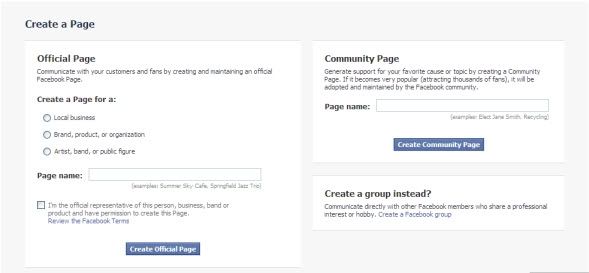It wasn’t an April Fool’s Joke — when Facebook announced on April 1 that it would be introducing Facebook Community Pages, they really meant it.
For anyone that hasn’t heard of a Facebook Community Page, this new designation can used to create a page that is focused on a cause, a person, an idea, or a group. Sounds pretty similar to a Facebook Group or Fan Page, right?
Sort of.
Here’s a breakdown of Facebook’s offerings:
- A Facebook Fan Page: Best used to promote a brand, business, website, a person or a product/organization, Fan Pages are run by administrators whose identities are concealed. Fan Pages can include FBML (Facebooks special mark-up language) as well as numerous applications and can push out updates similar to a personal Facebook page.
- A Facebook Group: Best used for hobbyists or folks with similar interests. A Group is run by a single or group of Facebook users and the identity of said user(s) is shown on the group page. Groups can be private or public and do not allow for the same update push that Fan pages do.
- A Facebook Community Page: This new feature can be used in concert with a Fan Page. In fact, according to many of the Facebookerati, the Community Page functionality was put in place so that unofficial fan pages could exist. According to Facebook, if a Community Page generates enough fans/supporters, it can be adopted and maintained by the Facebook Community. (Think of it as a Facebook-platform wiki)
Still confused? Say you run an ecommerce site built around selling pet toys. Your Fan Page can and should represent your website. Now say you’re the creator of a charity we’ll call Fido’s Friends. Where you wouldn’t talk about the charity a lot on your Fan Page, you could create a Community Page and list all of your upcoming projects and fund-raising events.
Setting up a Facebook Community Page
Creating a Facebook Community Page is fairly easy. Head to http://www.facebook.com/pages/create.php and select the type of page you want to create. Facebook took the liberty of describing what each type of page is suggested for if you’re confused.
Once you’ve created your Community Page, you can add as much flair as you want. The functionality is very similar (if not identical) to a Fan Page, so you are able to add apps including the much-loved FBML.
Once you have customized your page, you will be able to promote it to friends like you would a Fan Page and continue to collect Community “Fans.”


